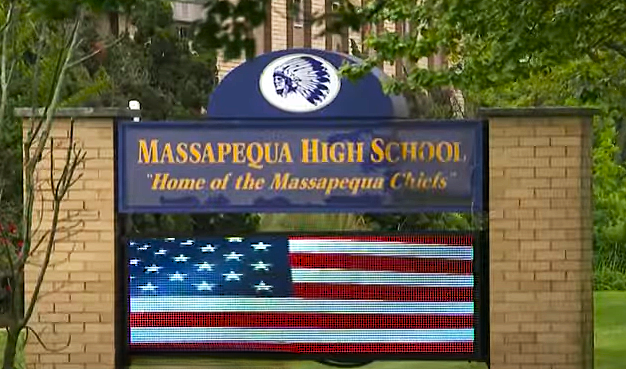Trump And Linda McMahon Ignite Fiery Battle Over ‘Mascotgate,’ Calling Long Island School Logo Fight A National Priority
- Natalie Frank
- Aug 25, 2025
- 4 min read
Updated: Aug 26, 2025
Massapequa and Connetquot school districts rally support as Trump and McMahon vow to defend cherished mascots against New York’s Native American logo ban
Natalie C. Frank, Ph.D August 25, 2025

MASSAPEQUA, NY - The fight over Native American mascots on Long Island has turned into one of the most emotionally charged battles in New York’s education system, with President Donald Trump and Education Secretary Linda McMahon announcing that the issue is a “top priority” for the administration. At the center of this storm sits Massapequa High School and its long-revered “Chiefs” mascot, a name some in the community see as integral to their identity and heritage.
Trump, who has long had ties to the town, did not mince words in his defense of the district. “I love Massapequa. I’ve heard that name for years,” he said, mentioning his admiration for the town’s traditions and people. “I have a lot of friends in Massapequa … We’ve got to get the name back to the Chiefs.” The former president, who once posed proudly in the Oval Office with a Massapequa sweatshirt, made it clear that he views the fight over the logo to be symbolic of a larger cultural struggle.
The controversy began with the New York Board of Regents’ 2023 statewide ban on Native American mascots and imagery in public schools. While intended to eliminate what state leaders believed to be discriminatory practices, the law has resulted in fierce resistance in communities where mascots like the Chiefs and the Connetquot Thunderbirds are seen as symbols of pride, tradition, and local unity.
McMahon, in agreement with Trump, criticized the state’s position and praised the two districts for their resilience. “It is a top priority of this Administration to protect Massapequa, Connetquot, and all Native American groups’ right to celebrate and preserve their cultural heritage,” McMahon said in a statement. She went even further in May, stating that stripping schools of such mascots amounted to a Title VI civil rights violation.
Speaking from Massapequa High School’s gymnasium at the time, McMahon praised the districts for standing strong “against woke ideologues who are attempting to strip them of their beloved Chiefs and Thunderbirds mascots.”
Local leaders say they will not back down. “We will never back down — we will always be the Massapequa Chiefs,” vowed school board president Kerry Wachter, underscoring the pride the town feels in having federal support on its side.
The battle has also become a legal fight. Massapequa has turned to attorney Oliver Roberts, a Harvard-educated lawyer who was born and raised in the town, to head their defense. Roberts has characterized New York’s position as both “sad and disgraceful,” indicating what he calls inconsistencies in how the ban is applied.
“The state is fighting us very hard,” Trump admitted, while adding that he remains confident the community will prevail.
Trump’s affection for Massapequa runs deeper than politics. He has spoken fondly of attending the wake of slain NYPD officer Jonathan Diller in the town earlier this year, visiting local landmarks like the beloved All American Burger, and praising the high school’s “championship” athletic traditions. These gestures have further endeared him to residents who feel their community values are under attack.
But not all districts are finding equal treatment in the mascot fight. Connetquot, which initially fought to preserve its Thunderbird identity, has since taken a more complicated path. The district quietly earmarked more than $23 million to phase out the mascot and entered back-room negotiations with state officials, eventually agreeing to adopt the shortened “T-Birds” moniker in exchange for dropping litigation. Many have criticized them for back room negotiations held behind closed doors.
That compromise has drawn sharp attacks from within. “To turn around, settle, and say ‘T-Bird — that’s no longer discriminatory,’ while it was two years ago, makes no sense,” said Connetquot board member Jacquelyn DiLorenzo. She condemned the reversal as “crazy and just political,” calling it a “huge slap in the face” to the community. DiLorenzo further blasted her colleagues as “very corrupt” for keeping negotiations behind closed doors.
McMahon also questioned the fairness of the state’s enforcement. She pointed to other ethnic-based mascots, such as Seaford’s “Vikings,” which remain untouched. “We will not allow New York education leaders to continue violating the Civil Rights Act by inconsistently and unlawfully deeming some national-origin-based mascots as acceptable while determining others are not,” she said.
Meanwhile, the Native American Guardians Association, which signed a contract allowing Massapequa to retain the Chiefs name, has mounted its own legal challenges against the state. Together with the school district, they are pursuing multiple avenues to preserve what they argue is a celebration, not a denigration, of Native culture.
For Trump and McMahon, the issue has become more than a local mascot battle—it is a political and cultural flashpoint. With passions running high, the outcome of “Mascotgate” may create a precedent for how schools across the country handle the complicated intersection of heritage, identity, and evolving social standards.






